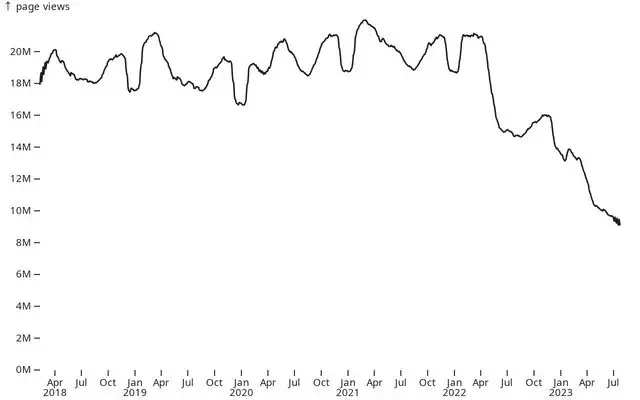Over the past one and a half years, Stack Overflow has lost around 50% of its traffic. This decline is similarly reflected in site usage, with approximately a 50% decrease in the number of questions and answers, as well as the number of votes these posts receive.
The charts below show the usage represented by a moving average of 49 days.
What happened?



You’re simplifying the situation and dynamics of science too much.
If you submit or share a work that contains a logical or experimental error – it says “2+2=5” somewhere – then yes, your work is not accepted, it’s wrong, and you should discard it too.
But many works have no (visible) logical flaws and present hypotheses within current experimental errors. They explore or propose, or start from, alternative theses. They may be pursued and considered by a minority, even a very small one, while the majority pursues something else. But this doesn’t make them “rejected”. In fact, theories followed by minorities periodically have breakthroughs and suddenly win the majority. This is a vital part of scientific progress. Except in the “2+2=5” case, it’s a matter of majority/minority, but that does emphatically not mean acceptance/rejection.
On top of that, the relationship between “truth” and “majority” is even more fascinatingly complex. Let me give you an example.
Probably (this is just statistics from personal experience) the vast majority of physicists would tell you that “energy is conserved”. A physicist specialized in general relativity, however, would point out that there’s a difference between a conserved quantity (somewhat like a fluid) and a balanced quantity. And energy strictly speaking is balanced, not conserved. This fact, however, creates no tension: if you have a simple conversation – 30 min or a couple hours – with a physicist who stated that “energy is conserved”, and you explain the precise difference, show the equations, examine references together etc, that physicist will understand the clarification and simply agree; no biggie. In situations where that physicist works, this results in little practical difference (but obviously there are situations where the difference is important.)
A guided tour through general relativity (see this discussion by Baez as a starting point, for example) will also convince a physicist who still insisted that energy is conserved even after the balance vs conservation difference was clarified. With energy, either “conservation” makes no sense, or if we want to force a sense, then it’s false. (I myself have been on both sides of this dialogue.)
This shows a paradoxical situation: the majority may state something that’s actually not true – but the majority itself would simply agree with this, if given the chance! This paradoxical discrepancy arises especially today owing to specialization and too little or too slow osmosis among the different specialities, plus excessive simplification in postgraduate education (they present approximate facts as exact). Large groups maintain some statements as facts simply because the more correct point of view is too slow to spread through their community. The energy claim is one example, there are others (thermodynamics and quantum theory have plenty). I think every physicist working in a specialized field is aware about a couple of such majority-vs-truth discrepancies. And this teaches humbleness, openness to reviewing one’s beliefs, and reliance on logic, not “majorities”.
Edit: a beautiful book by O’Connor & Weatherall, The Misinformation Age: How False Beliefs Spread, discusses this phenomenon and models of this phenomenon.